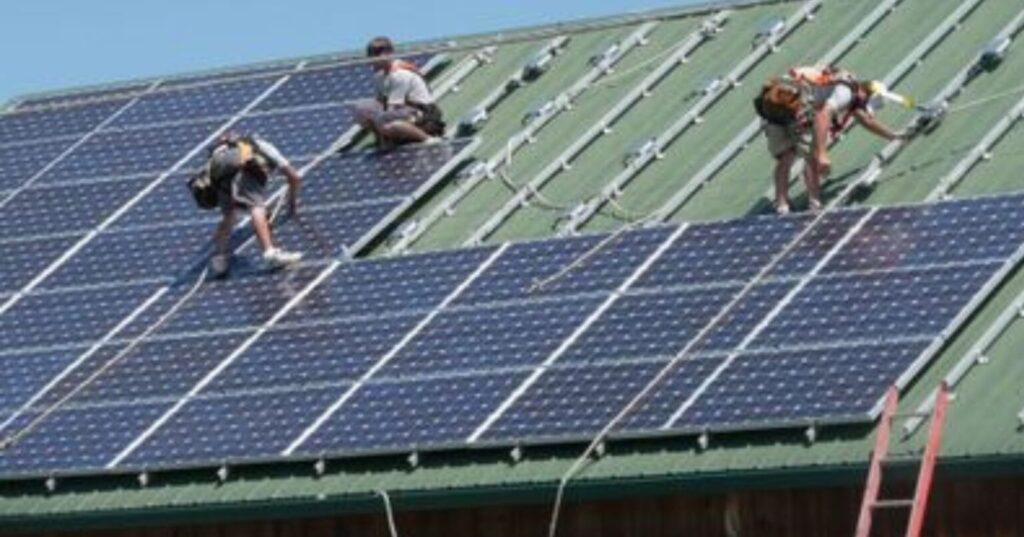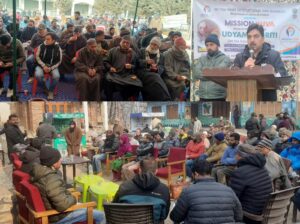J&K ahead of several UTs on solarization of Govt buildings All structures of 15 deptts to be covered by Dec 2024 RESCO Solar Model to be adopted for major deptts

JAMMU ,June 27 : Jammu and Kashmir is ahead of several other Union Territories (UTs) in the country on solarization of the Government buildings with 17% progress and steps have been initiated for covering all the structures of 15 departments by ending December 2024. However, for the remaining departments Renewable Energy Service Company (RESCO) model will be adopted as the same offers plethora of advantages for both consumers and developers.
Official sources told EXCELSIOR that the achievement of the Union Territory of Jammu and Kashmir on solarization of Government buildings was reviewed by the Secretary, Union Ministry of New and Renewable Energy Bhupinder Singh Bhalla yesterday and he expressed satisfaction over the progress made so far.
During the meeting, it came to the fore that J&K is ahead of several other Union Territories with the installation of rooftop solar plants on 3825 Government buildings against the target of 22494, which is around 17%. Till November 2023, only 1700 buildings were covered and the number has now increased to 3825, which was appreciated by the Union Secretary.
Puducherry has registered 3.17% progress while as there is no progress in Lakshadweep UT. Similarly, Andaman and Nicobar UT has made 5.5% achievement. Though in other UTs like Chandigarh and Delhi, the percentage is little bit more than J&K yet the same cannot be termed as significant as J&K UT is having several times more Government buildings as compared to all other Union Territories.
Among 3825 buildings solarized by Jammu and Kashmir Energy Development Agency (JAKEDA), which functions under the administrative control of Science and Technology Department, 2200 are schools and 1050 Panchayat Ghars. Even all the 16 Universities in the Union Territory of Jammu and Kashmir are having roof-top solar plants.
Sources informed that tender is being floated shortly for generation of 70 Mega Watts of electricity through solarization of more Government buildings. In respect of structures of 15 departments, deadline of December 2024 has been fixed by the Government.
These departments are Administrative Reforms, Inspections, Trainings and Grievances, Civil Aviation, Geology and Mining, Information and Public Relations, Planning, Development and Monitoring, Transport, General Administration, Hospitality and Protocol, Labour and Employment, Art and Culture, Food Civil Supplies and Consumer Affairs, Legal Metrology and Finance.
Sources disclosed that all the remaining departments including the major ones will be covered under RESCO model, which is being widely used in the solar energy sector in the country. The RESCO model presents a plethora of advantages for both consumers and developers as consumers gain access to clean and renewable solar energy at competitive rates with the added benefit of no upfront installation costs.
“So there will be two separate tenders-one under CAPEX for buildings of 15 Government departments and second for RESCO model for all the major departments which constitute 73% of the total Government buildings in the Union Territory of Jammu and Kashmir”, sources said while disclosing that ground work for both the tenders has already been conducted by JAKEDA.
These departments are Jal Shakti, Home, Law and Justice, Industries and Commerce, Health and Medical Education, Higher Education, School Education, Skill Development and Power. All the buildings of these departments will be covered by December 2025.
The solarization of Government buildings is being constantly monitored by a UT level committee headed by Chief Secretary with Administrative Secretary of Science and Technology Department its Member Secretary. Even Nodal Officers and Monitoring Committees have been constituted in all the departments for better coordination with JAKEDA.
In response to a question, sources said RESCO eliminates the need for a significant upfront investment, making it an appealing option for those who cannot afford the initial expenses associated with solar installations. Moreover, with a RESCO agreement, the service provider is responsible for maintaining and optimizing the solar system’s performance thereby reducing the burden on the customer. Further, RESCO allows flexibility in terms of system size and scalability, enabling customers to adjust their energy requirements over time as their needs change.
(CNI)









